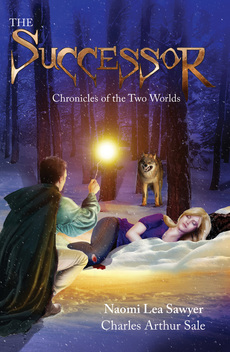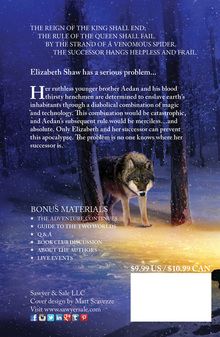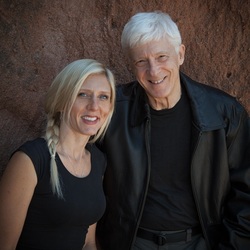November 14, 2016, 12:01 a.m (MST)...  Naomi Lea Sawyer With the publication of The Successor on November 14 and the finishing touches in progress on its sequel, I am struck by a strange sadness. Endings are funny things. As a reader I have found myself racing through a 700-page novel, ravenously devouring its contents in an effort to satisfy my insatiable desire to discover how the story ends, all the while hating how fast I was turning the pages because I did not want to turn that last page and end the experience. Watching an entertaining film last night, I found myself desperately wanting to know if the hero was going to find the bomb before it exploded and killed half the human race, while at the same time wishing the movie would not end. We bite our nails, stamp our feet, and involuntarily tense our muscles in eager anticipation of a conclusion. Not because we want to reach the end but because we want to make sure that everything is going to turn out okay or in some other way is satisfactorily concluded. Yet there is a part of me that hates for the conflict to be fully resolved. I have decided all this resolution stuff is an illusion. What some view as an ending is just another beginning. The seasons form a perfect metaphor for this. Fall is my favorite season. I love the parade of color, the crispness in the air, the thrill of watching the near-magical daily change in my surroundings. I know that the season will end: The cold white snows of winter will replace the brilliant yellows, oranges, and reds of fall. It is said that fall is essential death, being a temporary cessation of many processes we associate with life in both flora and fauna. Fall is the ending of one thing and the beginning of another. If this ending did not occur, I would never know the beauty of a falling snow flake, the joy of walking through virgin snow, or the pleasure of sipping a hot cup of tea while wrapped in a cozy blanket—or the coming of spring and the great planet-wide rebirth. The Successor is complete. Or is it? The work of delivering it to readers, who we hope will be entertained and uplifted, is just beginning. The Culling, its sequel, has only to be edited and processed for publication. Still, ending work on The Successor is a scary thing after so long a journey with my partner. Closing the door on edits and revisions that took eight years of my life and moving on to the next book—a scary thing. But if we didn’t end it, the characters in The Successor would be forever stuck—stuck repeating the same lines in the same places, telling each other stories within the story I told. It is time to move on, to prepare the rest of the story for you. And so with boldness I let go of The Successor and hand it on to you, dear reader. I hope you will make it your own, as I did for a time. I hope it brings you as much joy as it has brought me.  Charles Arthur Sale “People wonder why the novel is the most popular form of literature; people wonder why it is read more than books of science or books of metaphysics. The reason is very simple; it is merely that the novel is more true than they are.” ― G.K. Chesterton Soon, eight years of collaboration will culminate in the release of The Successor. On November 14, 2016, at 12:01 a.m. (MST) the book will become available in print and Kindle editions at Amazon.com. Other booksellers will follow. As a published non-fiction writer of long experience, I believed the transition to fiction, especially fantasy, would be relatively easy. I can string words together with passable skill. My non-fiction readers understood my meaning—I was tested in tough environments. Writing directives and speeches for executives in large organizations, political leaders, and scientists and engineers in academia required not only that my products be concise and understandable, but also that they block misunderstanding by any reasonable standard of interpretation. This experience was useful in my work on The Successor, but it was not enough. The demands of storytelling are unique. As Chesterton observes, the storyteller must convey truth that goes beyond facts. The poet must give us reality and then take us past reality to what lies beyond mere perception and arrangements of concepts. Words can only point. The storyteller takes us into unknown territory. Naomi and I invite you into unknown territory.
2 Comments
|
Naomi Sawyer & Charles Sale
January 2019
Categories
All
|

 RSS Feed
RSS Feed